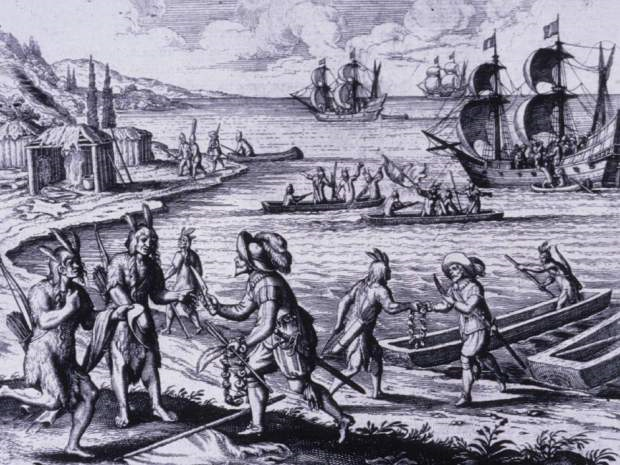Reading Log #3
- The main argument of the articles by Donald H., Holly Jr., and Ralph Pastore is the gradual extinction of the Beothuk population due to contact and invasion by the European in their native land of Newfoundland. These articles were written to show the gradual decline of the Beothuk group and to express the issues on how and why their population declined so significantly. These articles shed light on the large issue of European invasion on Native American population and how significant their impact was to them in terms of health, economy, and overall way of life.
- This article is convincing because many parts of the articles express the hardship the Beothuk’s had to endure when the Europeans came and settled on their land. In Donald H., and Holly Jr’s. article, The Beothuk on the Eve of their Extinction, it states that “more devastating to the Beothuks than the loss of the outer coast was the gradual expansion of Europeans into the inner reaching’s of the island’s bays, and inlets”[1]. This expansion by the Europeans greatly influenced the economy of the Beothuks due to the Europeans taking over “fishing for cod… salmon fishing, trapping, and hunting”[2]. In addition to loosing access to their naïve territory, the Beothuks began making their way into the deep interior of the island with few economic resources in an effort to avoid the Europeans. In the end it was noted that the extinction of the Beothuk population was a result of illness, starvation, and hostile attacks by the Europeans[3].
In Ralph Pastore’s article, The Collapse of the Beothuk World, he also talks about the issues seen in Donald H. and Holly Jr’s. article and also touches on the idea of the Beothuks extinction to be the cause of lack of contact with the Europeans. However, this idea was only speculations and there was no proof it is true. But in the end, both articles conclude that loss of contact with parts of Labrador and various regions of the island which were denied to them, eventually forced the Beothuks to withdraw to impoverished parts of the interior[4] which resulted in gradual extinction.
These articles contribute to the wider historiography on the topic because the gradual deterioration of Indigenous groups as well as their culture and tradition is still happening today. These article links to other articles we read because it has to do with the same ideas and issues of extinction and assimilation of Indigenous groups.
- Why didn’t the Beothuks take a stand and stay on their territory rather than leaving to the deep interior of the island and becoming extinct?
Why did the Beothuks avoid the Europeans? Was it because of possible epidemics or was it for other reasons such as not wanting to interact with the Europeans?
Why did the Europeans not assimilate the Beothuks into their culture?
Endnotes:
[1] Donald H., and Holly Jr., “The Beothuk on the Eve of their Extinction”, Artic Anthropology 37:1 (2000): 82.
[2] Donald H., and Holly Jr., “The Beothuk on the Eve of their Extinction”, 82.
[3] Donald H., and Holly Jr., “The Beothuk on the Eve of their Extinction”, 89.
[4] Ralph Pastore, “The Collapse of the Beothuk World”, Acadiensis: Journal of the History of the Atlantic Region 19:1 (1989): 71.
Bibliography:
Donald, Jr. Holly. “The Beothuk on the Eve of their Extinction”. Artic Anthropology 37:1 (2000): 79-95.
Pastore, Ralph. “The Collapse of the Beothuk World”. Acadiensis: Journal of the History of the Atlantic Region (1989): 52-71.
Link to the article:
Donald and Holly: http://eds.a.ebscohost.com.ezproxy.tru.ca/eds/pdfviewer/pdfviewer?sid=42f01a95-0857-4b02-bde5-833427004c28%40sessionmgr101&vid=5&hid=4208
Pastore: http://eds.a.ebscohost.com.ezproxy.tru.ca/eds/pdfviewer/pdfviewer?sid=42f01a95-0857-4b02-bde5-833427004c28%40sessionmgr101&vid=5&hid=4208
My reflection on the article:
The reason why I decided to incorporate this reading log into my ePortfolio was because it focused on some of the topics I find intriguing in History. These articles expresses the progressive destruction of an Indigenous group by the contact of European settlers in the Newfoundland area. This also links to our understanding of the area today because it is still a known issue that is discussed. These articles also contributes to my main argument of this ePortfolio because it is evidence to prove that History is not only about facts and information, but also the interpretations of others. The Beothuk population seemed to be very passive people who let the European settlers take over their native land. The Europeans on the other hand, seemed to be hostile people who had their own view of what this historic area of Canada should look like and function like, which the Beothuk people did not agree with. Both groups had their own views and interpretations of how this region of Newfoundland should be like, which made their relationship strained and led to the eventual extinction of the Beothuk population as well as a dark shadow over the Europeans in that time, as well as nowadays.
